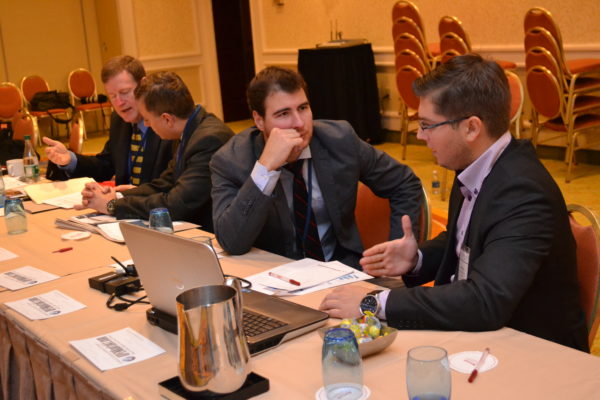
A group of European expatriates living in Connecticut are trying to build stronger ties between the Nutmeg state and their home countries in hopes of spurring investment and business partnerships.
The Central and Eastern European Network (CEENET) held its second annual trade visit at the Stamford Marriott Hotel Nov. 8-9, inviting both local and European business leaders to discuss potential business opportunities. Nearly 50 businesses, including 17 from Europe, participated in the two-day event.
“I”™m from Transylvania, so I love to see this happening,” Dana Bucin, a founding member of CEENET and an immigration lawyer in Hartford. “Romanians coming here, setting up businesses or businesses going to Romania, selling their products, it”™s music to my ears.”
Formed in 2010, CEENET is a group of Connecticut professionals interested in providing further international trade, investment and business opportunities between Connecticut and Central and Eastern Europe. Currently the group is in the process of applying for nonprofit status.
“Central and Eastern Europe is a great place to branch into Europe and Asia,” said Christopher Ball, CEENET president and Quinnipiac University”™s international economics chairman. “As a whole, Central Europe is a fantastic area with a lot of opportunities. It”™s very hard to talk about Hungary alone and the U.S. or Romania alone. But working together, the advantage, strategy ”¦ all of these things together, (we) gain so much. And the U.S. gains tremendously.”
In one panel, Romanian, Hungarian and Bulgarian officials and business representatives, along with Connecticut representatives discussed the benefits of international trade between Connecticut and Eastern Europe.
American companies have already invested $9 billion in Hungary, the panelists said. Bulgaria touts the lowest corporate and personal income tax rates in the EU, both at 10 percent. And there are major investment opportunities in the region, particularly the development of the Romanian Sea Port of Constanta, which is the fourth largest port in Europe, the participants said.
Following the fall of the Soviet Union, panelists said the countries have sustained their positions as emerging markets, largely for their cheap labor, access to raw materials and of course, location. Despite the financial crisis in the European Union, their economies have remained stable, panelists said.
Richard Laurenzi, the owner of Prospect Machine Products Inc., said he had made valuable contacts at the conference and was able to continue developing relationships with people he had met from previous CEENET events.
Prospect Machine Products, based in Prospect, Conn., manufactures custom, deep-draw metal stampings for a range of different industries. But Laurenzi said he was particularly interested in expanding in the automotive sector in Central and Eastern Europe. Roughly 10 percent of his sales are international, which includes the products he makes for Mercedes-Benz in Hungary.
“It”™s finding the proper places and the right door,” Laurenzi said. Because Mercedes-Benz has plants in Hungary and Romania, it could be a good way to segue into Germany and the rest of Europe.
“In my mind, if you”™re in manufacturing, you should be exporting,” CEENET”™s Bucin said. “The world is such a big market. Why shouldn”™t you?”















